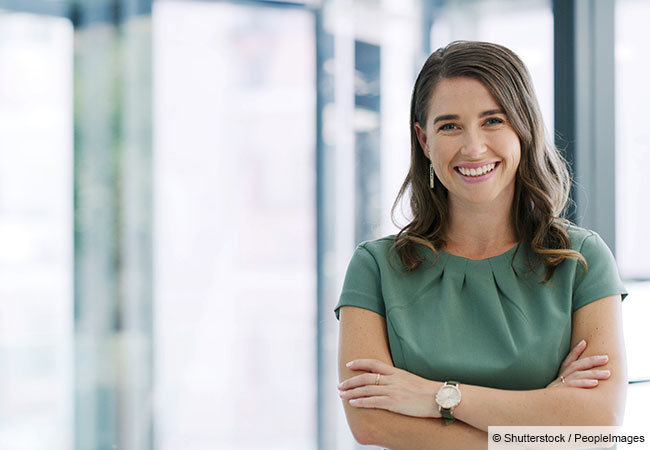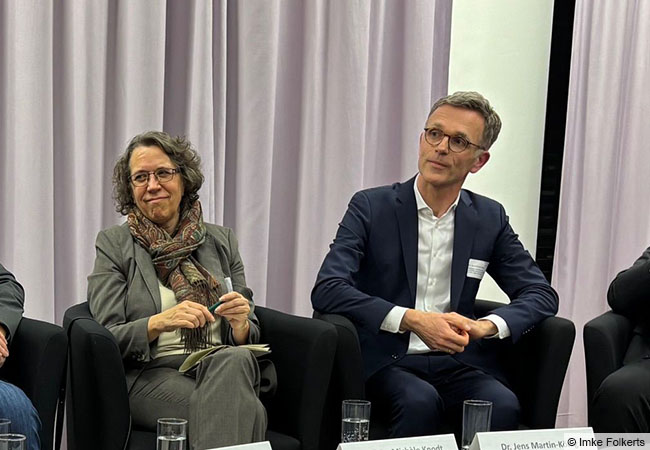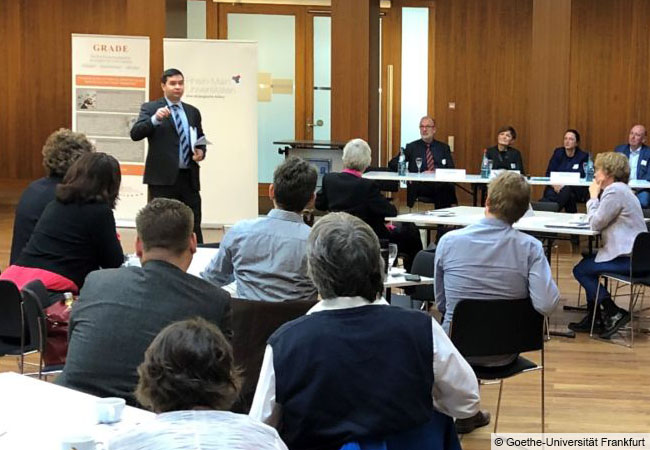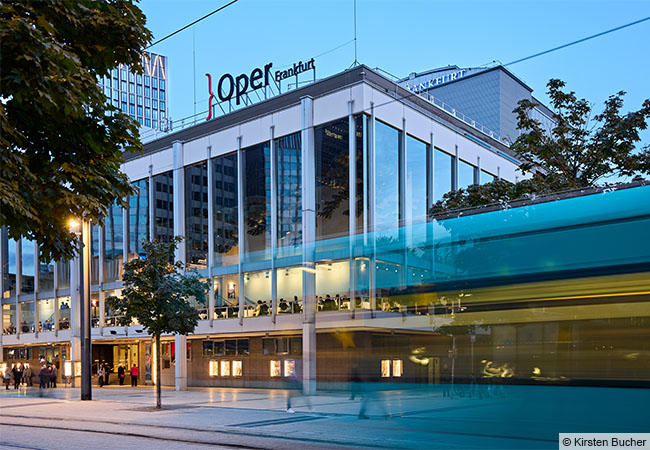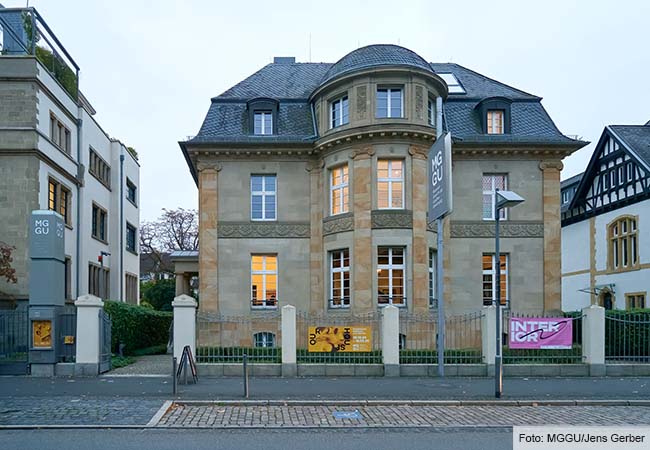Johann Christian Senckenberg University Library Director Daniela Poth talks about the institution’s ongoing strategic transformation process.
UniReport: Ms Poth, digitization is not a new catchword at the UB [University Library]. Yet the technical developments of the last 40 years have radically changed a genuinely old institution like the library.
Daniela Poth: Digitization is a huge challenge for all of society. The library introduced electronic data processing (EDP) at the end of the 1980s, which was later followed by the shift from print media to electronic media – which is by no means meant to say that printed media no longer exist today. These developments already served as an indication that libraries would become less important as places of scientific activity – especially in the natural and life sciences. It became possible to access media from anywhere, at any time. At more or less the same time, however, the Bologna Process-related structural changes to degree courses began to take effect. As a result, libraries became very significant (physical) places for students to learn. The greatest change has occurred in the last few years: The development of Open Science. With research data and results freely accessible, libraries are faced with the question of how important it will be in the future to continue building their stocks. Taking that thought further: How would such a change affect the role of a university library when it comes to supplying information? I am firmly convinced that the role of libraries will not change fundamentally: It continues to involve selecting, providing and contextualizing information to provide users with orientation. That is also enshrined in our mission statement: “We curate the information we offer for research, teaching and study, to meet the needs and the quality aspirations of science.”
Having adopted a mission statement, how do you plan to implement it?
The mission statement was the first step. It states where we are and where we want to be. On January 1, 2023, we restructured our organization to create the conditions necessary for realizing our mission. Three pillars form the basis of our activities: IT Services, the Acquisitions, Licenses and Metadata Department, and the Department of Information, Provision and Original Document Preservation. Apart from that, we still operate and perform tasks for the Hessian Library Information System (Hessische Bibliotheksinformationssystem, hebis) network headquarters [editor’s note: hebis is an information and service network of roughly 60 mostly scientific libraries in Hessen and parts of Rhineland-Palatinate]. We have two completely new units: One of them strengthens our position as a service facility for the university and focuses on places for learning and supporting scientific activity. The other is primarily dedicated to our historical stocks and special collections, focusing on supra-regional specialist communities. Together, as one University Library, we are now embarking on the path towards achieving our mission’s strategic objectives.
On the one hand, this process sounds never-ending, but there surely must be certain milestones.
This kind of process demands a lot of energy from everyone involved. That’s why it’s so important to make continuous development part of our routines. We’ve defined our mission for the next ten years – that’s a long time. But we want to realize its strategic objectives by 2026. If we can systematically implement them within the next three years, then will be a good time to check how close we’ve come to our vision and whether it remains relevant. The milestones include the implementation of an urgent recommendation to universities by the German Science and Humanities Council and the German Research Foundation: set up an “information budget”. The aim is to bundle all funding for Goethe University’s information provision and unify the management of all the different expenses. This includes both the acquisition and licensing of literature as well as the financing of Open Access publications and the securing of research data. We currently still have individual agreements with each faculty and operate over 50 cost centers. So, there is still a long way to go. And one final important point: In cooperation with our partners within the hebis network, we are right now replacing our library management system with an Open Source product. Although this shift is actually not directly linked to our strategic process, it does establish the framework for the future development of many workflows.
The description of the process contains terms such as SWOT analysis. Should we think of the contemporary university library like a company, which has to constantly analyze itself?
In my opinion, every organization would do well to take a critical look at itself now and again. As a library, we find that we are constantly acquiring new tasks without the existing ones decreasing in equal measure, let alone disappearing. Despite the growth in digital media, we still have to hold print media, for instance. Faced with no increases in our staff budget – which stagnates at best – and demographic change, which also doesn’t make it any easier for us to recruit staff, it will become more and more important to prioritize and to focus. The key question is: How can we deploy our human and material resources to provide the necessary support for research, teaching and study? We need to have a clear picture of our users’ needs and remain in an intense dialog with them. These are all good reasons for deploying instruments companies use as a matter of course.
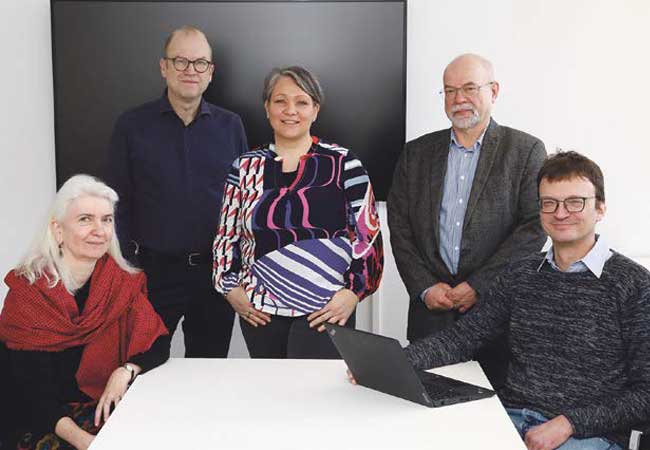
The project team (from left): Dr. Angela Hausinger, Dr. Mathias Jehn, Daniela Poth, Dr. Klaus Junkdes-Kirchen, Dr. Thomas Risse. (Photo: Uwe Dettmar)
Some say libraries have reached the end of their useful lives. Do you encounter any resistance from policymakers, the university administration, or maybe even from academics?
I have not yet heard of anyone fundamentally questioning the library’s existence as an institution. However, the challenges we face are certainly different from those of public libraries, which are financed by the municipalities. I think the Corona pandemic in particular showed the importance of having a public, non-commercial and physical space where people can meet. No one questions our responsibility when it comes to providing literature. But the newer tasks, for which no best practices exist, include processes of negotiation. So, when I talk about research data management, for example, then we, as a library, have the necessary skills for these activities. However, we would not be able to carry out the associated tasks on our own – and we don’t even attempt to. That is why Goethe University’s research data is jointly managed with the University Computing Center HRZ and with specially designated contact persons in the faculties. It only works if everyone knows what they have to contribute and if everyone pulls together.
All the same, the rapid progress in technology also throws up questions about the skillsets required by the staff. Would it be wrong to say that the jobs at the library are becoming increasingly academic?
I really couldn’t say if we can speak of an increasing academization in our profession. Due to the wide variety of tasks, a large number of people with very different professional backgrounds work at the library – ranging from apprentices to those with bachelor’s degrees in library science, all the way to colleagues with doctorates who develop services and tools at the interface with scientists at eye level. Digitization places increasing demands on all of us, which we have to tackle by working together. What’s more, some 40 percent of our library staff will retire over the next twelve years, generating a wide variety of challenges. One of them will be to ensure that the in-depth expertise of our departing colleagues is passed on to others, to ensure it doesn’t get lost. On the other hand, we will have to recruit new library staff with the right qualifications. Here we often find ourselves in competition with the private sector, in the field of IT for instance. That will remain a challenge not only for us, but for the entire public sector.
»WE ARE A (H)UB SUPPORTING PEOPLE, KNOWLEDGE AND SERVICES AT GOETHE UNIVERSITY.«
The first sentence of the University Library’s strategic mission is an expression of its future aspirations. That is, to become much more of a hub for interdisciplinary interaction and academic support, offering digital and other services on site that are specifically tailored to the needs of Goethe University researchers, teaching staff and students, while at the same time supporting supra-regional research. The library began the process of developing its strategy in late fall 2021 through a series of interviews with its employees. A representative cross-section of 41 of the approx. 350 staff members provided assessments of the status quo and of future possibilities, enabling an initial stocktaking. This internal view was subsequently supplemented with four analyses, as part of which a specially created strategy team examined external influencing factors, user perceptions, stakeholders, and the library’s core competencies. Together with top management, the team then carried out a SWOT analysis that produced a profile of strengths (S), weaknesses (W), opportunities (O) and threats (T). On this basis, they then elaborated potential directions for the library’s development, and by the summer of 2022 had created a template for preparing the strategy. Important success factors in this process were repeatedly seeking feedback from library staff and managers, and bringing in external experts, users and Goethe University’s Executive Board, which approved the UB’s strategic mission on August 2, 2022. The first step towards implementation was the structural reorganization carried out at the beginning of this year. You can read the entire mission statement (in German) on the University Library’s website. https://www.ub.uni-frankfurt.de/ueber/strategie.html
Your staff was closely involved in the UB’s strategic process. Do you think the pressure to change is causing them worry or anxiety?
Changes always bring anxiety. The reactions here have ranged from, “libraries have always had to evolve – that’s not new to us,” to, “why does anything have to change – everything’s working just fine as it is.” We launched the process in 2021 by conducting employee interviews, to obtain an overview of where the staff saw a need for further development and what they wanted the process and the future of the library to look like. While strategies are geared at the outside world, we decided from the beginning that we also wanted to look within. For us it was clear from the outset that we can only evolve successfully if we establish a culture of change in the library that is supported by as many people as possible. As our strategy started to take shape, we therefore always included formats for open discussions with the staff on the interim results and incorporated their feedback.
The next question is about the identity and role of the UB: In its “Mission 2032”, the UB states that its own mission fits into Goethe University’s strategy. Do closer ties with Goethe University constitute a challenge, given that the Johann Christian Senckenberg University Library also performs library functions beyond the confines of the university?
The library’s roots go back a long way in the history of Frankfurt and are closely associated with the history of the foundation Dr. Senckenbergische Stiftung. That is manifested not only in our name, but also in our stocks. These special collections are valuable to research communities far beyond Goethe University. We want to continue living up to this responsibility. We align our own ongoing development very clearly to that of Goethe University, and as one of its central services, we of course feel obligated to our funders. At the same time, our history mandates that we make our special collections accessible for supra-regional research. We plan to arrange our activities in a manner that ensures that both benefit from the other.
Does the development as a place of learning – something affecting students most of all – also feed into the library’s orientation?
For us, it’s important to gain an even better understanding of the changing needs of our users in the future. Students are a very important target group, since they benefit both from the library’s infrastructure as well as from the physical space. That is why their needs are often intimately tied to the options for the targeted development of the premises, and also to new uses for them. Sometimes there is a mismatch. Some people want flexible spaces for collaboration, others a concentrated working atmosphere where they can study in silence. We want to engage in a more intensive dialog with the students in the future and implement whatever is feasible within our existing premises.
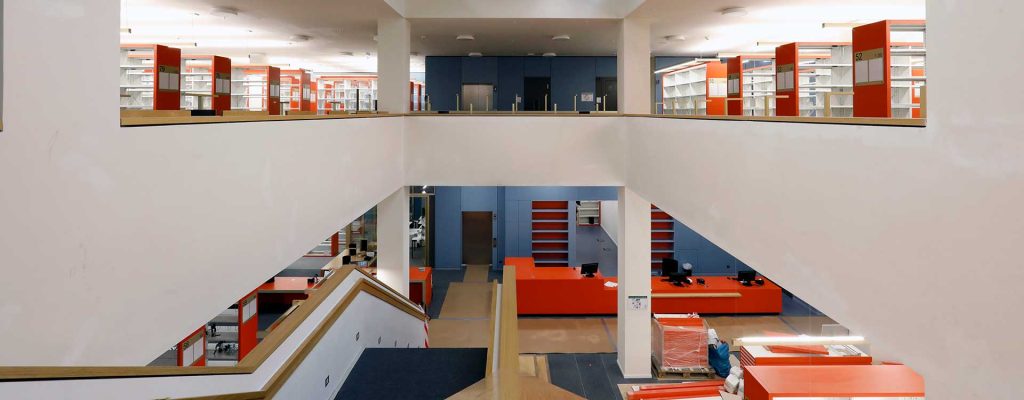
These days there are many players in the information society, including publishers for example, who also offer services that could be interesting to some of users – against payment of course. Can academic libraries survive in the face of such competition?
Libraries lost their monopoly on information a long time ago. Alongside our portals and catalogs, scientists also often use Google or Google Scholar for their research. It depends on what you’re looking for. Print materials especially can hardly be found using Google and co. Major academic publishing houses today offer researchers excellent digital services specifically designed to support their research work all the way from the initial question to the publication of scientific findings. That is something no individual library can do, and it’s also difficult to achieve in cooperation with others. Our strength lies elsewhere: We do not pursue profit. That is important, especially when dealing with data. When large academic publishers offer an all-inclusive package, it’s often accompanied by a more or less uncontrolled use of the data. Data sovereignty is an important advantage to be purposefully applied.
As of the end of last year, after roughly 20 years of planning, we now have six subject-specific libraries on Goethe University’s campuses. But the last major component is still missing – the main library on the Westend Campus. Planning the construction of such a large new building must naturally also take account of the developments in such a volatile field. What could, what should the new UB look like?
Answering that requires a multifaceted answer. The Central Library at Bockenheimer Warte currently holds nearly five million physical media items in its magazines (some of them underground), including many historical items with special requirements relating to security and air conditioning. They will continue to require suitable locations for housing and usage. But the Central Library is much more than that. It is the workplace of many of our experts: The majority of the work on our media as well as most administrative tasks are carried out here. Most importantly, however, the Central Library is a neutral place. Whereas all nine libraries at other sites cater to certain faculties, the Central Library stands for the University Library as a whole. “We are a (H)UB supporting people, knowledge and services at Goethe University.” This sentence is part of our vision, outlined in the mission statement. A new building that stands for the university’s entire library system offers an opportunity to bring this sentence to life in a special way. It should be a place of interdisciplinary and transdisciplinary exchange, a place that invites collaboration on developing solutions for the complex problems of our time. And it should be open to everyone: Researchers, teaching staff, students, administrative staff and interested citizens. The extent to which it will reach the public outside the University will, however, depend on the site itself.
Needless to say, the accessibility and surroundings at the Westend Campus are different than those at the Bockenheim Campus.
At Bockenheimer Warte, we are located in the middle of the city – which is helpful for connecting with the general public. For the new location, we will have to think about how we can reestablish this connection, for example through exhibitions or discussions that are relevant to Frankfurt citizens. I studied architecture before I did my internship as a librarian. In architectural theory, we speak of the “genius loci” – referring to the desire to take account of a place’s spirit when creating its architectural design. Given today’s very dynamic developments, which we as a library also have to deal with, it would be great to have a permanent budget for ongoing development. Dreaming never hurt anyone… [laughs]. As far as aspects of sustainability are concerned, I have full confidence in the members of my previous profession, who have already realized outstanding sustainable architecture projects.
Questions: Dirk Frank



